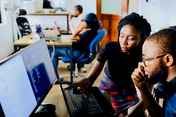Establishing priorities for action
Once a robust sense-making phase has been completed, the next step is to establish priorities for action. This could be led by the Steering Committee, by other organizations, or as a broader and more participatory community exercise. As in every stage of the data cycle, young people should be core participants in action planning.
- Whichever approach you choose, if you are planning to continue around the data cycle to act on the data, you will need to narrow your focus for next steps. Undoubtedly, dozens of points of concern or opportunity have become clear over the sense-making period. In some cases, participants in that process can take responsibility for following up on opportunities for change that they can influence or achieve. That can be supported with a community action report, community dialogues and events, presentations to various decision-making and service organizations such as local council, and those focused on specific sectors such as the school system. Core questions for these engagements can include: Do the survey findings support your policies, programs or practices?
- Do the findings identify gaps that call for new responses?
At the same time, the organizations who delivered the survey can identify where their resources are best applied and where there are ready opportunities for action. Priorities for action might be chosen because of urgency of need, opportunities to make a quick impact or some combination of the two. For example:
- Improve access to social activities for newcomer youth
- Establish a breakfast program at local schools
- Institute a youth advisory council as an adjunct to local government
When determining how many priorities to take on, considerations will include timelines, resources and distribution of effort. In some cases, gathering more information may be necessary through primary or secondary research, such as:
- Information about existing services
- Focus groups with targeted youth to learn about underlying conditions and explore possible solutions
- Existing research from other communities or sources that have experience in an area of interest





































